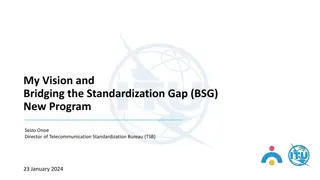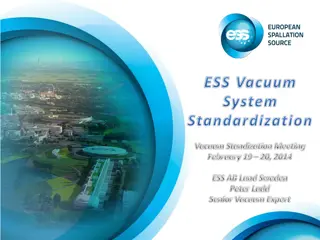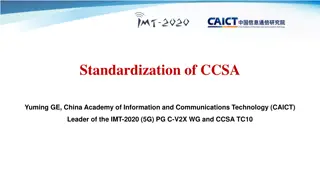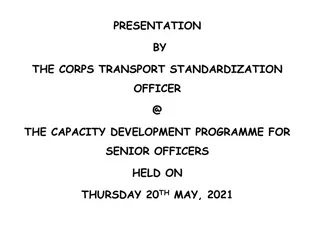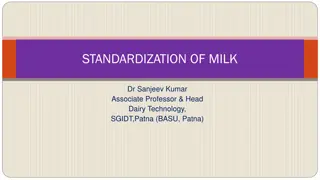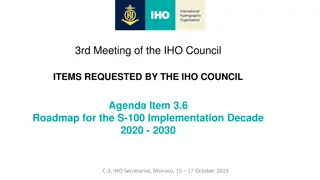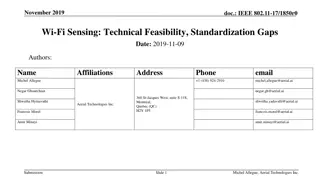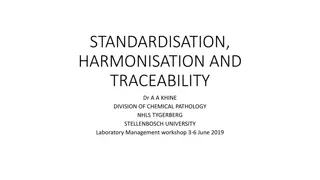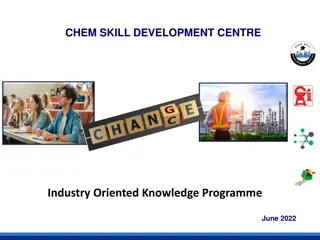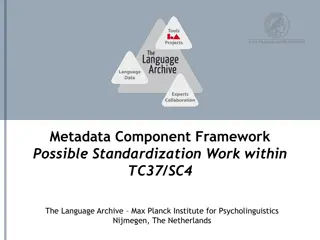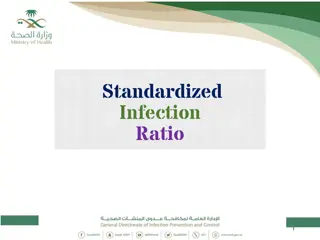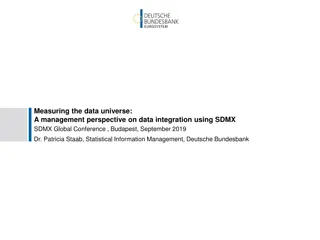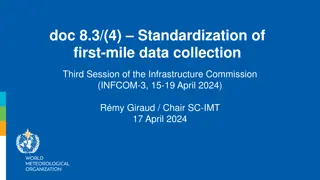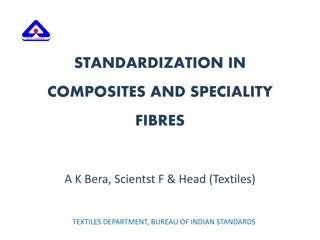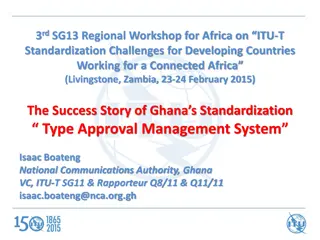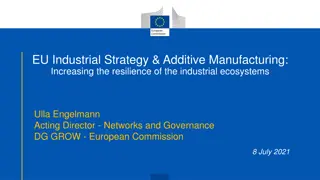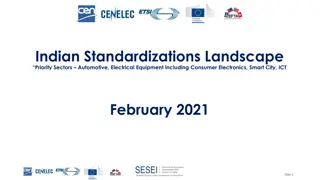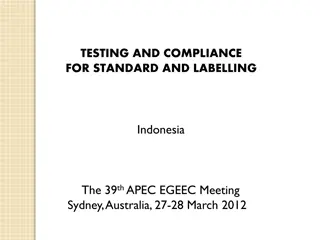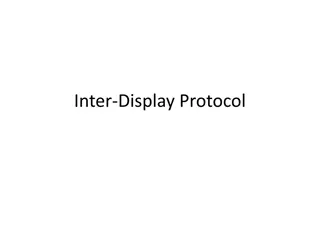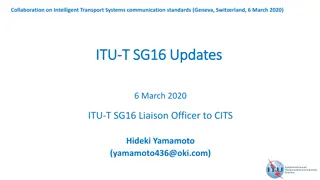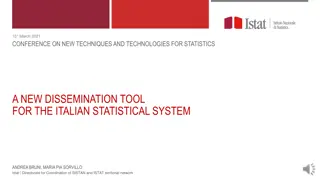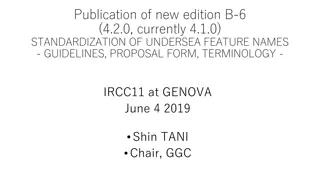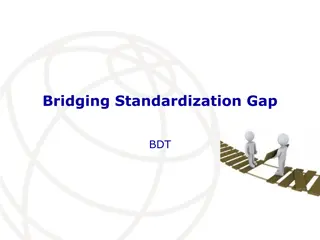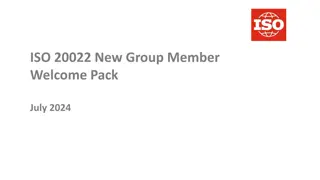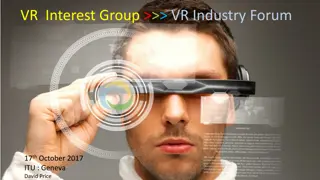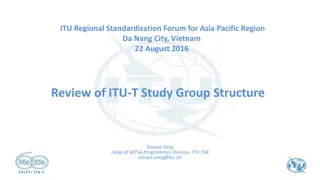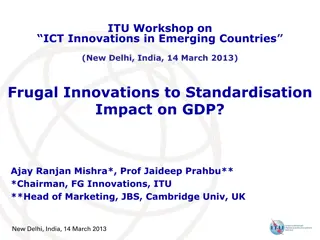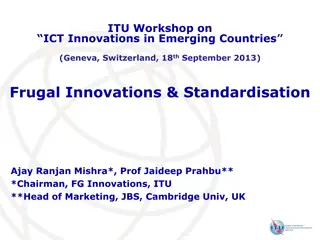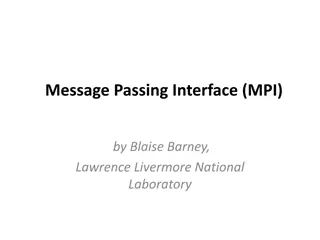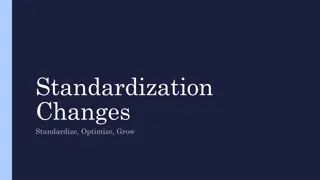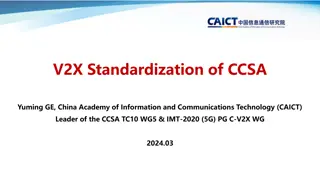Transforming Scientific Data Standardization with Large Language Models (LLMs)
Large Language Models (LLMs) to standardize scientific data, including data format standardization, automatic extraction of metadata, data annotation, data quality assessment, data cleaning, and documentation.
2 views • 5 slides
Standardization Concepts for CubeSat Applications
Understanding the importance of standardization in CubeSat applications, this document discusses the need for reliability and the adoption of SAVOIR standardization for avionics. It covers the mapping of SAVOIR functionalities into CubeSat architecture and explores how standardized practices can enh
2 views • 15 slides
Bluetooth SIG September 2023 Update on Spectrum Sharing Plans
Bluetooth SIG provided an update on their actions and plans for sharing the 5 and 6 GHz bands with incumbents and unlicensed devices. They aim to collaborate with the Wi-Fi industry to enable equitable sharing for Bluetooth, particularly focusing on the 6 GHz band. The overall plan includes forming
4 views • 8 slides
My Vision and Bridging the Standardization Gap (BSG) New Program
Seizo Onoe, Director of Telecommunication Standardization Bureau, presents his vision for bridging the standardization gap, emphasizing the importance of industry engagement and wide adoption of standards for global benefit and market growth. By enhancing cooperation between standardization bodies a
1 views • 11 slides
ESS Vacuum System Standardization Meeting Overview
The ESS Vacuum System Standardization Meeting held in Lund, Sweden, focused on standardizing vacuum equipment and requirements for accelerator, target, and neutron scattering instruments. The scope of activities of the ESS vacuum team, vacuum requirements, integrated approach, and available faciliti
0 views • 8 slides
Standardization and Innovation in China's Telecommunication Sector
This content delves into the standardization efforts lead by Yuming GE from China Academy of Information and Communications Technology (CAICT) in the IMT-2020 (5G) field. It highlights the various technical committees and special task groups under CCSA responsible for different facets of communicati
1 views • 14 slides
Road Transport Safety Standardization: The Role of the Corps Transport Standardization Officer
The presentation highlights the Road Transport Safety Standardization policy and the role of the Corps Transport Standardization Officer in regulating fleet operators, ensuring safe transportation operations, and promoting a culture of safety consciousness. It covers the functions of the officer, im
1 views • 13 slides
Understanding Milk Standardization: Methods and Objectives
Milk standardization is the process of adjusting milk constituents to meet legal requirements and ensure product uniformity. This involves reducing butterfat content through addition of skim milk or removal of cream. The primary objectives include legal compliance, uniform product quality, and effic
0 views • 13 slides
Advancing S-100 Implementation for Shipping Industry Transformation
Explore the strategic roadmap and key drivers behind the S-100 implementation decade 2020-2030, focusing on operational infrastructure, technical standardization, and collaboration with industry. Uncover the crucial role of S-100 for enhancing shipping navigation, driving digitization, and opening n
1 views • 9 slides
Exploring Wi-Fi Sensing: Feasibility and Standardization Gaps
Delve into the technical aspects of Wi-Fi sensing, discussing its definition, feasibility, and standardization gaps according to the IEEE 802.11 standard. The presentation highlights the ability of Wi-Fi systems to detect environmental changes and explores scientific publications related to Wi-Fi se
0 views • 27 slides
Achieving Comparable Results in Laboratory Practice
Good laboratory practice necessitates minimal error in measurement to reflect a patient's biological condition accurately, ensuring comparable and reliable results regardless of testing location or method. Standardization, harmonization, and traceability play crucial roles in achieving uniformity an
0 views • 29 slides
Industry-Oriented Knowledge Programme by CHEM.SKILL.DEVELOPMENT.CENTRE June 2022
CHEM.SKILL.DEVELOPMENT.CENTRE (CSDC) offers an industry-oriented knowledge programme to bridge the gap between theory and practice. The objectives include enhancing employability, providing practical knowledge, building confidence, and understanding industry practices. The programme's strategy invol
0 views • 14 slides
Standardization Process for Metadata Components in Language Archives
The standardization process for metadata components within TC37/SC4 at the Language Archive Max Planck Institute involves analyzing existing metadata sets, seeking input from the CLARIN EU community, and determining the next steps for standardization. The process includes forming submission groups,
0 views • 23 slides
Understanding Standardized Infection Ratio (SIR) in Healthcare
The Standardized Infection Ratio (SIR) is a crucial metric used to monitor Healthcare-Associated Infections (HAIs) at various levels. It allows for improved risk adjustment and comparison by providing a single summary number. Standardization methods like direct and indirect standardization help in a
0 views • 44 slides
Managing Data Integration: A Management Perspective
The data universe is expanding rapidly, leading to challenges in organizing and extracting valuable information. Dr. Patricia Staab discusses the importance of integrating data using SDMX at the SDMX Global Conference in Budapest. The approach involves moving towards an application-driven architectu
0 views • 12 slides
Standardization of First-Mile Data Collection in Infrastructure Commission Session
The content discusses the importance of standardizing first-mile data collection in the context of the Infrastructure Commission's session. It highlights key decisions made regarding addressing issues related to lack of standardization and requests for collaboration among relevant committees. The Wo
0 views • 7 slides
Standardization in Composites and Speciality Fibres by A.K. Bera
This content highlights the standardization levels, composite material database standards, infrastructure at both national and international levels, chain of validation of composites products, and constituent material specifications and test methods in the textiles department under the Bureau of Ind
0 views • 18 slides
Standardization of Underwater Resources Assessment in Pacific Sea Cucumber Fisheries
This study focuses on the challenges in assessing sea cucumber fisheries in the Pacific, emphasizing the need for standardization in methodologies, data collection, and capacity building. Lessons from regional studies highlight the importance of comprehensive surveys and species identification. Capa
0 views • 21 slides
Innovations in Geotechnical Solutions: Enhancing Standards for Technical Textiles
Geotechnical expert Shahrokh Bagli discusses the importance of standardization for geosynthetics in India, highlighting the need for new products and innovations. Emphasizing the role of user ministries and applications, the conclave addresses the scope for standardization and the requirements of th
0 views • 9 slides
Enhancing Standardization with Ghana's Type Approval Management System
Exploring the success story of Ghana's Standardization Type Approval Management System at the 3rd SG13 Regional Workshop for Africa. Isaac Boateng from the National Communications Authority shared insights on the technical and regulatory requirements, challenges, and the importance of Type Approval
0 views • 18 slides
European Union Industrial Strategy and Additive Manufacturing
The EU's industrial strategy focuses on enhancing the resilience of industrial ecosystems through additive manufacturing. The manufacturing industry in Europe is a vital driver of employment, innovation, and prosperity. Despite being a front runner in metal and hybrid 3D printing, the EU faces chall
0 views • 6 slides
Indian Standardizations Landscape: Priority Sectors and Bodies Overview
Explore the Indian standardizations landscape focusing on priority sectors like automotive, electrical equipment, consumer electronics, smart city, and ICT. Gain insights into key players, initiatives of the Indian government, and major standardization bodies such as BIS, TSDSI, and TEC. Learn about
0 views • 68 slides
Energy Efficiency Standardization and Labeling Requirements in Indonesia
Indonesia's energy conservation efforts are outlined through government regulations requiring testing and compliance for energy efficiency standards and labeling. The regulations cover responsibilities of government and private sectors, as well as guidelines for energy performance standards and labe
0 views • 16 slides
Overview of Inter-Display Protocol Standardization with Wayland/Weston
This overview delves into the standardization of the Inter-Display Protocol using Wayland/Weston, focusing on sharing surfaces between ECUs and OSs. It explores the definition of the protocol at Wayland, receiver daemon, HMI transmitter plugin, Weston core, backend, adaptation plugins, and implement
0 views • 10 slides
Enhancing Name and Address Parsing for Data Standardization
Explore the project focused on improving the quality of name and address parsing using active learning methods at the University of Arkansas. Learn about the importance of parsing, entity resolution, and the token pattern approach in standardizing and processing unstructured addresses. Discover the
0 views • 11 slides
Recent Achievements in Intelligent Transport Systems Communication Standards
Recent achievements in Intelligent Transport Systems communication standards include the establishment of new focus groups, such as FG-AI4AD and FG-VM, to drive standardization activities for AI in autonomous driving and vehicular multimedia. These groups aim to improve safety, performance, and publ
0 views • 10 slides
New Dissemination Tool for Italian Statistical System - Conference Highlights
The 10th March 2021 Conference on New Techniques and Technologies for Statistics showcased a new dissemination tool for the Italian Statistical System presented by Andrea Bruni and Maria Pia Sorvillo from Istat. The project focuses on improving data dissemination quality, hub architecture in pull mo
0 views • 7 slides
Revised Guidelines for Standardization of Undersea Feature Names - Edition B-6 (4.2.0)
Updates in the new edition (4.2.0) of the Standardization of Undersea Feature Names - Guidelines, Proposal Form, and Terminology include the removal of the list of national authorities, emphasis on marine research-related names, improved name proposing procedures, and the introduction of a Fast-Trac
0 views • 8 slides
Bridging the Standardization Gap in ICT Development
Participation in ICT standardization processes is essential for bridging the gap between developed and developing countries. Strong standards aid in establishing technical requirements, ensuring safe and interoperable ICT equipment, and reducing the digital divide. Initiatives such as capacity build
0 views • 15 slides
Overview of ISO 20022 Standardization and Governance Framework
ISO 20022 is a comprehensive standardization approach for financial services, emphasizing common methodologies, processes, and repositories. The ISO 20022 Welcome Pack outlines key ingredients, development processes, and the eight essential parts of ISO 20022. Governance is managed by the Registrati
0 views • 25 slides
Understanding Web APIs and Document Object Model (DOM)
Delve into the realm of Web APIs and the Document Object Model (DOM) with a comprehensive exploration of different classes, standardization, and node interface attributes and methods. Discover the significance of DOM in accessing and manipulating XML and HTML documents while navigating through the c
0 views • 41 slides
Data Preprocessing Techniques in Python
This article covers various data preprocessing techniques in Python, including standardization, normalization, missing value replacement, resampling, discretization, feature selection, and dimensionality reduction using PCA. It also explores Python packages and tools for data mining, such as Scikit-
0 views • 14 slides
Accelerating VR Industry Growth: Transition from VR Interest Group to VR Industry Forum
The VR Interest Group is transitioning into the VR Industry Forum to boost the growth of the VR industry by facilitating collaboration, setting standards, and accelerating adoption. With a focus on removing hurdles and benefiting both industry stakeholders and consumers, the formal organization aims
0 views • 14 slides
Regulatory Challenges in the U.S. Coke Industry: Insights from the ACCCI
The American Coke and Coal Chemicals Institute (ACCCI) addresses regulatory issues concerning the U.S. coke industry, representing major players in coke and coal chemicals production. The institute focuses on sector-specific concerns, industry regulations, and advocating industry interests to govern
0 views • 29 slides
ITU Regional Standardization Forum for Asia-Pacific: Review of Study Group Structure
The ITU Regional Standardization Forum for Asia-Pacific in Da Nang, Vietnam, held on August 22, 2016, reviewed the structure of ITU-T Study Groups. The vision and objectives of WTSA-16, the current ITU-T structure, and the proposed enhancements to WTSA-16 were discussed. Emphasis was placed on prepa
0 views • 19 slides
The Impact of Frugal Innovations and Standardization on GDP Growth in Emerging Countries
This content discusses the role of standardization in economic growth, showcasing case studies from Germany, UK, Canada, and Australia. It also highlights insights from the Global Innovation Index on top innovative countries. The analysis questions the relationship between connectivity, innovation a
0 views • 6 slides
Impact of Standardization on Economic Growth in Emerging Countries
Standardization plays a crucial role in the economic growth of emerging countries by contributing significantly to GDP growth and labor productivity. Case studies from countries like Germany, UK, Canada, and Australia highlight the positive impact of standards on innovation and overall economic perf
0 views • 8 slides
Understanding Message Passing Interface (MPI) Standardization
Message Passing Interface (MPI) standard is a specification guiding the development and use of message passing libraries for parallel programming. It focuses on practicality, portability, efficiency, and flexibility. MPI supports distributed memory, shared memory, and hybrid architectures, offering
0 views • 29 slides
Standardization Changes for Organizational Growth
Initiating standardization in organizational structures and processes allows for optimization of efforts, leading to growth and sustainability. This involves setting deadlines for various standardization milestones like email, dues, officer roles, and elections, emphasizing the importance of uniform
0 views • 28 slides
CCSA V2X Standardization and Technology Architecture Overview
Overview of the China Communications Standards Association (CCSA) involvement in V2X standardization, covering technical committees, application scenarios, messaging interfaces, and related standards. The application of 5G, LTE-V2X, and various V2X scenarios like remote driving, automated parking, a
0 views • 31 slides



